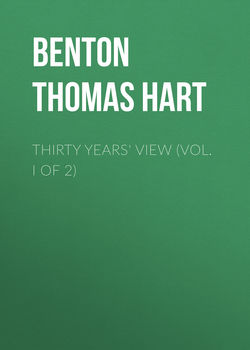Читать книгу Thirty Years' View (Vol. I of 2) - Benton Thomas Hart - Страница 7
CHAPTER IV.
RELIEF OF PUBLIC LAND DEBTORS
ОглавлениеDistress was the cry of the day; relief the general demand. State legislatures were occupied in devising measures of local relief; Congress in granting it to national debtors. Among these was the great and prominent class of the public land purchasers. The credit system then prevailed, and the debt to the government had accumulated to twenty-three millions of dollars – a large sum in itself, but enormous when considered in reference to the payors, only a small proportion of the population, and they chiefly the inhabitants of the new States and territories, whose resources were few. Their situation was deplorable. A heavy debt to pay, and lands already partly paid for to be forfeited if full payment was not made. The system was this: the land was sold at a minimum price of two dollars per acre, one payment in hand and the remainder in four annual instalments, with forfeiture of all that had been paid if each successive instalment was not delivered to the day. In the eagerness to procure fresh lands, and stimulated by the delusive prosperity which multitudes of banks created after the war, there was no limit to purchasers except in the ability to make the first payment. That being accomplished, it was left to the future to provide for the remainder. The banks failed; money vanished; instalments were becoming due which could not be met; and the opening of Congress in November, 1820, was saluted by the arrival of memorials from all the new States, showing the distress, and praying relief to the purchasers of the public lands. The President, in his annual message to Congress, deemed it his duty to bring the subject before that body, and in doing so recommended indulgence in consideration of the unfavorable change which had occurred since the sales. Both Houses of Congress took up the subject, and a measure of relief was devised by the Secretary of the Treasury, Mr. Crawford, which was equally desirable both to the purchaser and the government. The principle of the relief was to change all future sales from the credit to the cash system, and to reduce the minimum price of the lands to one dollar, twenty-five cents per acre, and to give all present debtors the benefit of that system, by allowing them to consolidate payments already made on different tracts on any particular one, relinquishing the rest; and allowing a discount for ready pay on all that had been entered, equal to the difference between the former and present minimum price. This released the purchasers from debt, and the government from the inconvenient relation of creditor to its own citizens. A debt of twenty-three millions of dollars was quietly got rid of; and purchasers were enabled to save lands, at the reduced price, to the amount of their payments already made: and thus saved in all cases their homes and fields, and as much more of their purchases as they were able to pay for at the reduced rate. It was an equitable arrangement of a difficult subject, and lacked but two features to make it perfect; first, a pre-emptive right to all first settlers; and, secondly, a periodical reduction of price according to the length of time the land should have been in market, so as to allow of different prices for different qualities, and to accomplish in a reasonable time the sale of the whole. Applications were made at that time for the establishment of the pre-emptive system; but without effect, and, apparently without the prospect of eventual success. Not even a report of a committee could be got in its favor – nothing more than temporary provisions, as special favors, in particular circumstances. But perseverance was successful. The new States continued to press the question, and finally prevailed; and now the pre-emptive principle has become a fixed part of our land system, permanently incorporated with it, and to the equal advantage of the settler and the government. The settler gets a choice home in a new country, due to his enterprise, courage, hardships and privations in subduing the wilderness: the government gets a body of cultivators whose labor gives value to the surrounding public lands, and whose courage and patriotism volunteers for the public defence whenever it is necessary. The second, or graduation principle, though much pressed, has not yet been established, but its justice and policy are self-evident, and the exertions to procure it should not be intermitted until successful. The passage of this land relief bill was attended by incidents which showed the delicacy of members at that time, in voting on questions in which they might be interested. Many members of Congress were among the public land debtors, and entitled to the relief to be granted. One of their number, Senator William Smith, from South Carolina, brought the point before the Senate on a motion to be excused from voting on account of his interest. The motion to excuse was rejected, on the ground that his interest was general, in common with the country, and not particular, in relation to himself: and that his constituents were entitled to the benefit of his vote.
